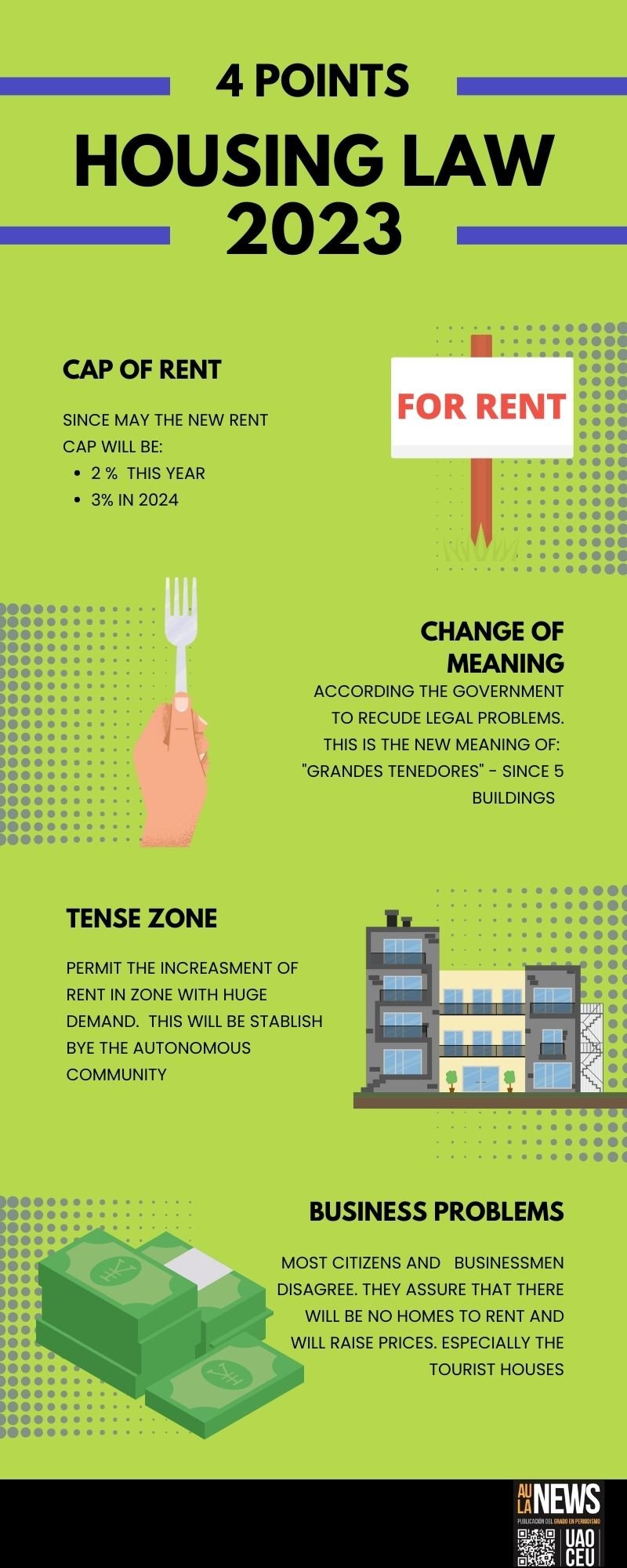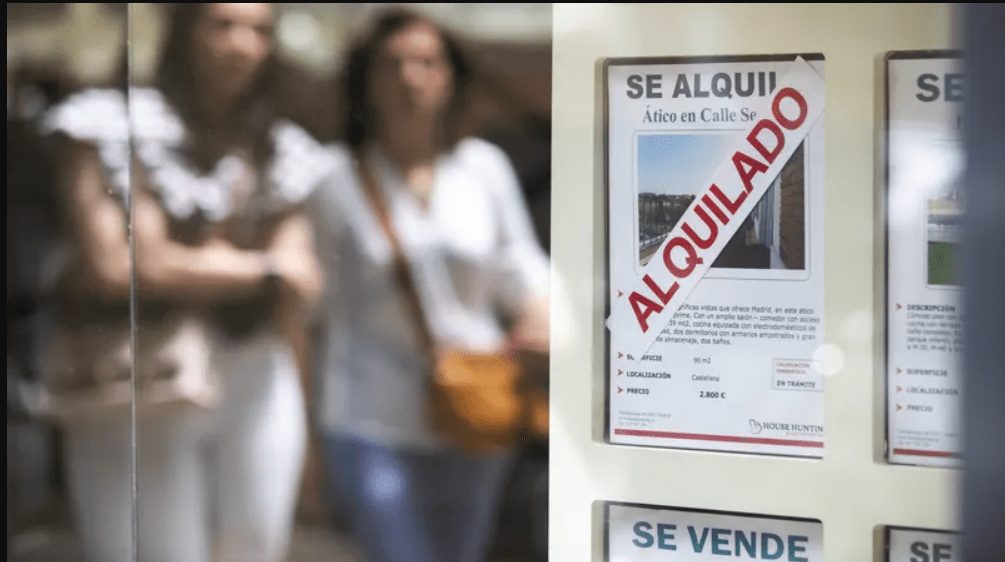After months of preparation for the new standard will entail a series of important changes for the real estate sector and citizens, being an emergency measure for inflation and economic and social recovery that the country is experiencing, where the price of housing has increased by 50% since 2013 and 30% of households allocate more than 40% of their income to rent or mortgage payments. With this law, the Government intends to improve living conditions, especially for the future generation.
However, the rental market will be intervened for the first time in Spain thanks to the housing law that the Government has presented after reaching an agreement with Esquerra Republicana and EH Bildu, members of the Senate. This measure has generated a great debate for the parties and citizens.
Principles aspects of the law
After the financial crisis of 2008 caused thousands of evictions due to the abusive clauses of mortgages. Generating debts for many families and that the subsequent bubble in the rental market has caused rental prices to rise more than expected to date. This situation has brought many investors and large owners. The Minister of Social Rights and Agenda 2023 stated that the new law protects tenants and balances the balance between real estate and owners under the guarantee of the right to housing.
Government has announced a series of measures to address the housing crisis in Spain, where rental prices have fallen by 3.8% during the pandemic but remain high in some areas. The main measures are: limiting rental prices in the most tense areas according to a reference index that will be updated every year; expanding the public housing stock by mobilizing vacant housing and building new developments; protecting tenants against evictions by suspending them in cases of vulnerability and mediating between the parties and regulating tourist accommodation by requiring a mandatory register and a limit of places per area.
More than 50% of citizens have considered the new regulation not useful”
According to the report on Perceptions of the new Housing Law, prepared by the Grupo Mutua Propietarios, housing is a complex right that poses many difficulties when it comes to legislating.
Likewise, more than 50% of ctizicens have considered the new regulation not useful, as their concerns are squatters or whether the housing where they live is a tense area and whether in this current pre-campaign they will offer better changes.
The keys to the Housing Law
With a few weeks to go before the new rule comes into force, it brings with it a vocabulary that new tenants do not know and possible situations that they should take into account when signing a contract.
According to the report on Perceptions of the new Housing Law, prepared by the Grupo Mutua Propietarios, housing is a complex right that generates many difficulties when legislating. Likewise, more than 50% of Spaniards have considered the new regulation not useful.
Thanks to the support of the senate, the agreement that has been under development since 2022 brings new figures of rental prices and conditions, hoping for the elimination or reduction of abusive clauses. Therefore, one should consider whether they want to live in a tense area.
What is a stressed zone?
With the new law, more than 10 million homes are reported to be located in stressed zones, representing 61% of Spain. This including provinces such as Madrid and Barcelona. Therefore, those zones are defined as long as they meet any of the conditions set by the Law: the average cost of the mortgage or rent plus basic expenses and supplies exceeds 30% of the average income in each household, or that the price of the zone has increased three points above the CPI in the previous hundred years.
What does “Gran Tenedor” mean?
It refers to any Spanish citizen or company that owns more than ten properties, regardless of where in Spain they are located.
Will there be a rent price limit?
According to a report by Century 21 Spain and Portugal, Barcelona is the only city in the country where families exceed the recommended effort to meet rent payments. Moreover, the new housing law sets a ceiling of 2% for 2023 and 3% for 2024. For the following years, new calculations will be made and the CPI (Consumer Price Index) will be eliminated as a reference index for the annual update of rent contracts.
What will happen to illegal squatters?
“If there is no money, they will only be electoral promises”
The Civil Procedure Law and the new law provide for changes in eviction. The State Security Forces and Bodies will not be able to intervene by surprise, they will have to communicate the day and time. Now it is estimated that judges will have to request a report from social services to verify whether the person is vulnerable or an illegal squatter.
“If there is no money, they will only be electoral promises”, commented the economist José Ignacio Conde-Ruiza. Faced with the situation in Valencia, where several blocks of flats from Sareb are occupied by non-paying and less than 40% of tenants manage to pay the rent.
There are currently citizens who are against the housing law as a result of the protection received by vulnerable people. That’s the situation of Rocio Goméz, who can’t reclaim her house because of someone whom won’t leave the placement.
Como inquilina que también soy, necesito del alquiler de mi vivienda de Marbella. La que tiene hipoteca. Y que si no la pago, me la quitan.
Tengo una inquilina que no me paga desde hace 18 meses. Ella misma me dijo, que no lo iba a hacer.
Que la ley le protege.
Y así es. pic.twitter.com/5Z9UmnagRx— Rocío Gómez (@Rociogomezb1972) May 11, 2023
What is an empty house?
According to the National Institute of Statistics (INE), an empty house is considered when no one uses this property, whether seasonally, periodically or sporadically. Therefore, they are “uninhabited” houses. However, for these real estate properties they will receive a 50% surcharge from the local authorities, as long as the owner is the owner of 4 or more properties. If this was not inhabited for 3 years, the amount will rise to 100%.
PRE-CAMPAIGN 28M AND HOUSING LAW
Less than a month away, the most prominent candidates to preside over the Government of Spain for the next few years are Pedro Sánchez, for the PSOE; Alberto Núñez Feijóo, for the PP; Santiago Abascal, for Vox and possibly Yolanda Diaz, for Sumar.
Recent polls showed an advantage for the PP over the PSOE in these elections. According to the surveys, Feijóo would win the elections with 31.6% of the vote estimate, 6 points more than Sánchez. In addition, Vox would obtain almost 5 points more than the average of the polls.
VIDEO REPORT
PROPOSALS
In addition the electoral campaign has put the new Housing Law as a topic for their proposals and aimed at young citizens, among them stand out:
PSOE:In the last PSEO rally, he announced a guarantee of up to 20% of the mortgage for young people up to 35 years old who earn less than 37 thousand euros per year (or double if there are two buyers of the house). In the case of families with minors in charge, there will be no age limit with the same individual limit as young people.
PP Party: During the month of April he announced a proposal in which he promised to guarantee 15% of the total purchase so that, together with the mortgage, young people get 100% of the money they need to be able to acquire it.
Vox: Proposes construction of public social housing in rental regime with option to buy to guarantee that young people and low-income families achieve a home. “Housing is a social good and we know how to do it,” said the VOX deputy.
Sumar: Yolanda Diaz has developed a “listening” program thanks to the support of the Housing Manager of the Barcelona City Council, Javier Burón. The main objective of this program is to develop a public housing service and to achieve a guarantee for the residents. “A housing policy oriented to the general interest must guarantee the existence of minimum wage and maximum rent”, said the candidate.
LEGAL DEFETS & REQUIREMENTS
Another blow to the owner and their families in the face of inflation and the new changes they bring in the Housing Law. Among the most controversial is how it will evolve to relationship between companies and tenants.
1. Doubts of Information
Article 31 of the Housing Law requires real estate agencies to provide information on the data of the owner of the property they offer for rent or sale. This measure has generated controversy among professionals in the sector, who fear that it will affect their activity and the data protection of their clients.
Carles Sala, director of the Legal Area of the COAPI of Barcelona, lawyer and doctor of law from the UAB, considers that this article is confusing and contradictory with the regional regulations on consumer and data protection. The property agents of Barcelona have consulted the Catalan Consumer Agency and the Data Protection Agency to clarify how to apply this provision.
2. Landlord pays
The new Housing Law in Spain harms the real estate sector, according to the lawyer José Ramón Zurdo, lawyer specialized in leases and general director of the Rental Negotiation Agency (ANA). He questions that landlords have to pay management expenses and that deposits are limited to one month’s rent. These measures could lead to the disappearance of some real estate agencies and the lack of professionalization of the sector.
3. New Requirements to future tenats
If you want to rent out your property, you must comply with the new law that requires you to obtain a certificate of habitability. This is a document that proves your home meets the minimum standards for living, such as sanitary, dimensional and safety requirements.
To get this certificate, you need to provide the plans of your home and its location. Also, need to disclose any information about the presence of asbestos or other hazardous substances in your home.
Finally, you need to inform the tenants about the built and usable area of your home and its registration data.

